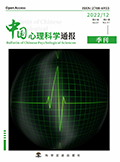

民办高校大学生是我国大学生群体中的重要组成部分, 探索民办高校大学生心理健康状况及其影响因素, 有助于高校辅导员、心理咨询工作者有针对性地开展心理健康教育工作。本研究着眼于剖析情绪调节策略、人格特质与心理健康之间的关系, 研究主要使用问卷调查法, 获取民办高校266名大学生的有效数据。通过对三个变量进行差异检验, 相关分析以及回归分析, 发现民办高校学生更倾向于使用认知重评策略; 人格五因素中, 顺从性、神经质、外向性和严谨性在人口学维度上都存在显著差异。一年级学生在心理健康总分、自我否定、忧郁和焦虑的得分上都显著高于四年级学生的得分, 担任过干部的学生的心理健康状况要优于未担任过干部的学生。情绪调节策略中的表达抑制策略能显著预测心理健康水平, 其中神经质、外向性在两者之间起完全中介作用。神经质与严谨性对心理健康总分的影响最大, 外向性与严谨性对自我否定存在负向的预测作用, 神经质对忧郁、焦虑有正向的预测作用。
Private university students are an important part of Chinese college students. Exploring private university students' mental health status and its influencing factors will help college counselors and psychological counselors to carry out mental health education work. This study focuses on the analysis of the relationship between emotion regulation strategies, personality traits and mental health, and mainly uses questionnaire survey to obtain effective data of 266 college students in private universities. Through the difference test, correlation analysis and regression analysis of the three variables, it is found that students in private universities are more inclined to use cognitive reappraisal strategy. Among the five personality factors, agreeableness, Neuroticism, Extraversion and conscientiousness have significant differences in demographic dimension. Freshmen scored significantly higher than seniors in total mental health scores, self-denial, depression and anxiety. Students who had served as class leaders had better mental health status than students who had not served as class leaders. The expression inhibition strategy of emotion regulation strategy can significantly predict the level of mental health, and neuroticism and extraversion play a complete mediating role between them. Neuroticism and conscientiousness had the greatest effect on the total score of mental health. Extraversion and conscientiousness had a negative effect on self-denial, while neuroticism had a positive effect on depression and anxiety.